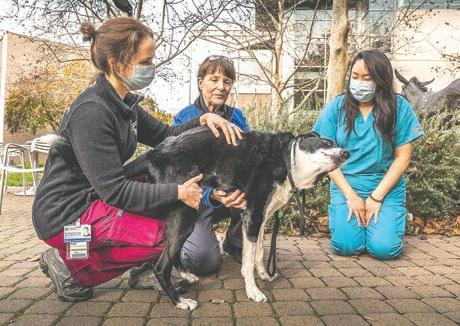
6 minute read
Chinese News at
Hector Amezcua/Sacramento Bee/TNS file a border collie named River gets love from UC Davis School of Veterinary Medicine neurology and neurosurgery veterinarians Marguerite Knipe, left, and amanda Xue, right, outside the small animal clinic with his owner Lin Drafton, Dec. 20.
Ruff recovery
Paralyzed border collie back on the move after surgery
Tribune ConTenT AgenCy
SACRAMENTO — A border collie who suffered spinal injuries and was paralyzed in his hind legs after collapsing unexpectedly in October can stand and is beginning to walk again, following neurosurgery six weeks ago by UC Davis veterinarians.
River came in to UC Davis after suddenly being unable to stand and walk on his own, said UC Davis veterinary neurology resident Amanda Xue. What a difference six weeks make.
River strutted his stuff Dec. 20 as UC Davis touted his quick recovery from surgery. Xue and the UC Davis team did an MRI and found he had “essentially a slipped disc,” Xue said.
UC Davis veterinarians drilled a hole in River’s back and extracted the material that was compressing his spine.
“He’s exceeded my expectations,” Xue said. “He looked really, really good on his checkin exam today. He’s walking on his own and wagging his tail.
“I’m really optimistic he’ll continue to make improvements. He’s done a lot of hard work to get where he is today.”
River’s owner, Linda Drafton, took the dog in for a recheck exam at UC Davis Veterinary Medical Teaching Hospital’s small animal clinic. The past two months has been a whirlwind. She drove three and a half hours from the Redding area to UC Davis to get River help on Halloween; now her dog is mostly back to normal.
“He is so close to being himself again compared to when I brought him down,” Drafton said. “I keep telling folks here this is a miracle. It’s a miracle this dog recovered like this. Just a miracle.”
Neurologists say River will need months of rehabilitation, but his prognosis for recovery is good. higher in Blacks, Hispanics, and Asian Americans.
And keep in mind the CDC’s definition of MIS-C at this point requires hospitalization. Milder inflammatory syndromes may well exist at higher numbers that don’t cross that threshold, or don’t get identified, or don’t get associated with Covid at all.
The syndrome is characterized by fever, and the involvement of at least two organ systems. The gastrointestinal system is very commonly involved. And conditions like myocarditis and heart failure and other cardiac manifestations. There’s typically a lag time of about a month from when the child first had the Covid. They may or may not even know they had the Covid. A lot of the kids end up in the ICU. Thankfully, most recover. A few die, and some have lingering symptoms.
In young adults, it’s not so much different. It’s a similar pathway. The same thing is happening in the body. It’s just at a different age.

What do you hope to learn about kids with long Covid?
We want to understand the development trajectory in these children. If in fact that’s altered, that would be unique in kids. What we see often is the child does not have a clear head. Brain fog is a term that people have been using. Another aspect is this lack of stamina or reduced exercise capacity, or inability to even take on normal aspects of daily living. I think those symptoms are similar in adults. But we don’t really know in the very young children. If they are acting a little differently, is that long Covid, or is it changes associated with normal childhood development?
And I think there’s a second type of long Covid.
When someone in the child’s life orbit has gotten Covid, there can be stress, economic deprivation, loss, grief, survivor guilt – all these kinds of things may happen. I think the whole pandemic has been traumatic to many.
Veteran
From Page A3
spending time in a rehabilitation center, decided to move into an assisted living home.
“If I went back to my apartment in Tampa, I could live a lot cheaper than here,” Monfort said. “But at my age, it probably wouldn’t be long before I’d be needing some help in the home. Here, they’ve got everything.”
As he enters his 105th year, Bill Monfort is content.
He isn’t sure there’s anything particular he’d like people to know about his life. As one of the last surviving veterans of World War II, he just wants people to remember the conflict.
“Just that it happened,” he said. “We were there.”

If some of these long-term symptoms are due to inflammation, would anti-inflammatory medicines be helpful?
I think we know that the MIS-C piece has a lot of inflammatory components. But the long Covid, I don’t think we know. There’s a tremendous amount of uncertainty. It wouldn’t surprise me if some of it was inflammatory.
At the moment, a lot of the focus has been looking at rheumatological drugs and immune modulators rather than general antiinflammatories, although steroids have played a role (in treating hospitalized patients). Part of what this study may do is identify patterns of symptoms that then are sufficiently homogeneous that patients can become – should they volunteer and be willing – participants in research studies to understand treatment.
You’re looking to identify distinct phenotypes: distinct groups of symptoms that seem to hang together, so that we can say ‘Ah, this is a group for whom we can study both the mechanisms of the illness, and therefore how we might disrupt those mechanisms with therapeutics.’ It’s like the step before doing a trial. But there’s no question that identifying who to treat, and various treatments and how effective they are, is the ultimate goal of this.
Tell us about your other study to predict which children are most at risk
It’s ongoing. We’re actually looking at a bunch of things. We’re looking at what’s going on in the community. We’re looking at social determinants of health, various stressors that might impact the body. And we’re looking at the genetics and genomics of those factors, and we’re looking at the immune function. That’s the focus we have, bringing that together with clinical data, what comorbidities or other illnesses they have, then also the community factors. We want to bring all of those together to try to help predict who is at greatest risk.
Are there ways to prevent long Covid?
The best way to prevent long Covid is to avoid being infected with Covid.
Vaccination, among those who are eligible, is essential to the population and public health response to this. Vaccination is the first and foremost. Also masking and social distancing.
How might the omicron variant change the equation?
Each of these new variants poses a risk. As variant gives way to more variants, does that change the prevalence of long Covid? Does a less severe infection mean you’re more likely to get long Covid? Less likely to get long Covid? We don’t know these things. Some of them we’ll never know. We’ll at least be able to study them on average.
weddings anniversaries birthdays baby showers





